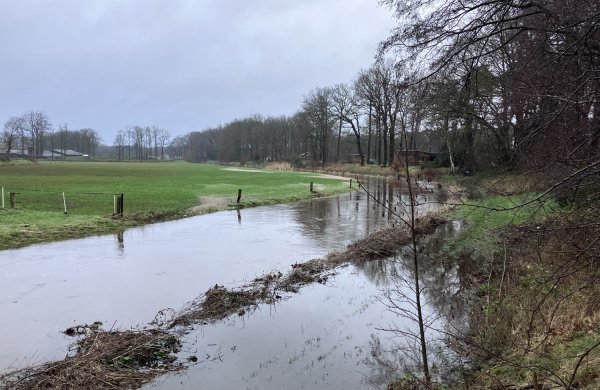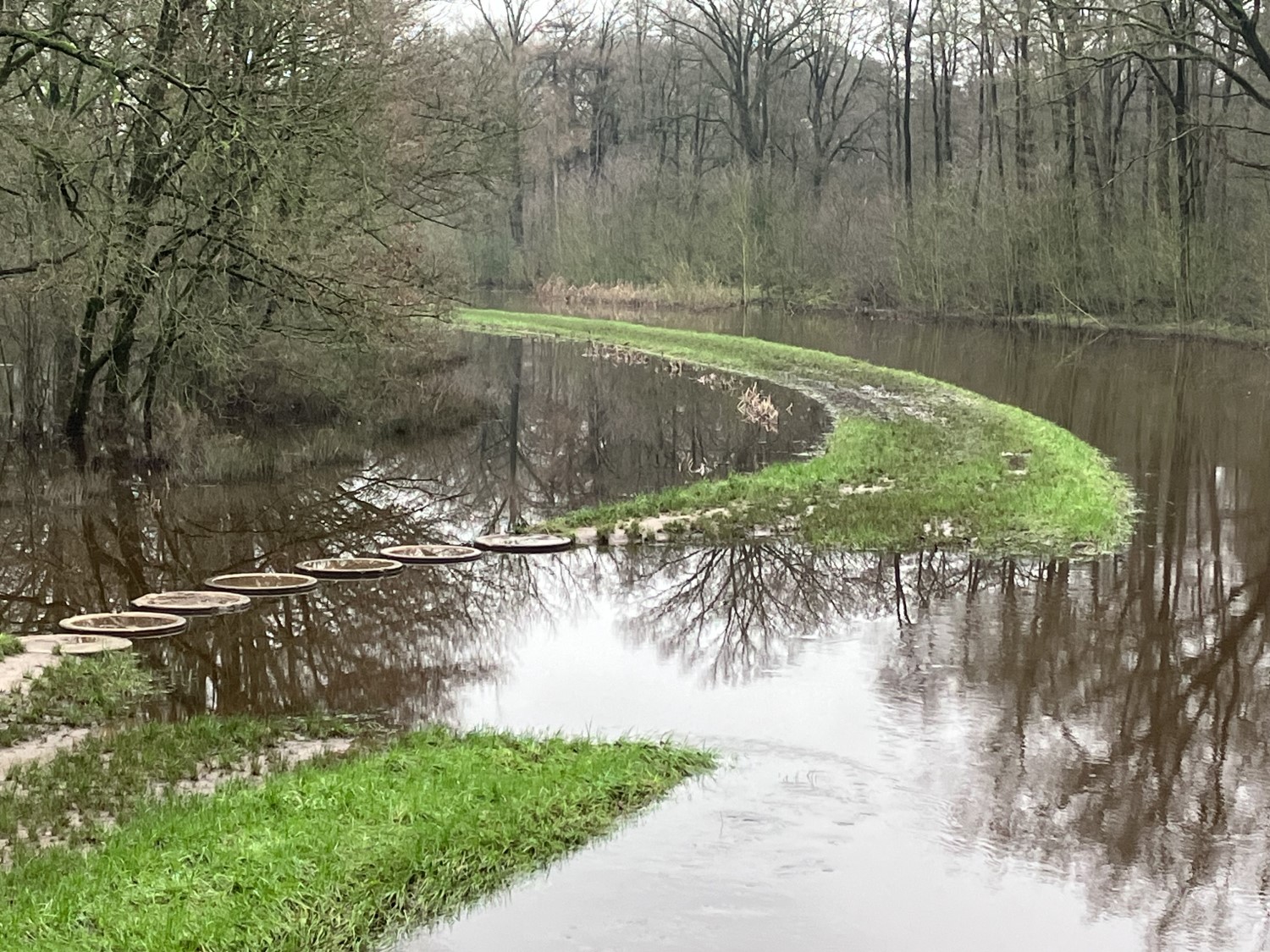
Longread
‘We need greater water awareness’
The increased frequency of floods and droughts caused by climate change is eventually going to make the current approach to water management unaffordable for the government. Stijn Reinhard and Vincent Linderhof of Wageningen Economic Research argue that an economic perspective of water issues can reveal more efficient solutions and smarter policies.
Climate change is making our winters milder and wetter. Sea levels are also rising, and extreme weather events are increasing. On the one hand, this means that torrential downpours are becoming more intense and more frequent. On the other hand, summers are getting hotter and drier, causing water shortages.
‘The nature of our water supply is different now compared to when we landscaped the country some 40 years ago or even further back, and that’s due to climate change,’ says Stijn Reinhard, senior water economist at Wageningen Economic Research. At the time, the agricultural sector opted for land consolidation and the lowering of groundwater levels as a way of making a lot of land more suitable for growing crops. Now that our winters are wetter, the obvious reaction is that more and more water needs to get drained very quickly. But in summer, droughts occur more frequently, because so little water is collected and stored in the soil.
More expensive water management
The government has to allocate more and more money to protecting people from floods. Measures for flood protection include creating more space for water, or raising river dikes. ‘The cost of water management is only going to increase, and that’s partly due to climate change,’ says Reinhard. In November, Mark Harbers, the Minister of Infrastructure and Water Management, revealed that more money is needed for dike reinforcements than was previously estimated. Water board taxes and the cost of tap water are also due to rise sharply next year. ‘It’s time to consider a different approach to water problems,’ the researchers say.
Water awareness
The issue is exacerbated by a lack of ‘water awareness’ in the Netherlands. The Dutch government has always ensured the supply of sufficient, clean and affordable water, and the provision of dikes and the Delta Works to prevent flooding. Dutch citizens do not feel personally responsible for water. They take it for granted that they can live safely behind the dikes. And the cost of drinking water is so low that many people hardly pay attention to it. Moreover, there is hardly any incentive to use water efficiently or reduce water use.
The need for behavioural change
‘The key question is,’ says Reinhard, ‘how can the government keep the cost of water management manageable? Because ultimately, the taxpayer pays.’ His colleague Vincent Linderhof adds: ‘The usual approach up until now is to mainly consider technological solutions, such as building dikes. However, these are expensive. You could place more emphasis on behavioural change as an alternative.’
For example, farmers could more often accept that groundwater levels will be a little higher. In Spring, the groundwater level is kept low to allow heavy machinery to work the land. If you don’t reduce groundwater levels as much in spring – by closing ditches or restoring natural streams, for example – more water will be stored in the soil. This will reduce downstream flooding in built-up areas during downpours, and in summer, soils would retain their moisture for a longer period of time, benefiting farmers. Higher groundwater levels are also necessary for nature restoration and to comply with European rules with regard to nature management.
A higher water level does require farmers to make adaptations to their current practices, otherwise it can lead to crop damage. ‘But often, rather than keeping groundwater levels so low, it will be more economically efficient to look for a solution that includes compensating some farmers if higher groundwater levels benefit other purposes,’ says Reinhard.
Citizens can play a role with their roof and garden
There are also ways for people to capture water by making modifications in and around their homes. Reducing pavement in gardens can allow more water to infiltrate the soil. Green roofs can reduce the impacts of extreme rainfall in summer, and contribute to biodiversity. ‘Campaigns and grants can stimulate people to adopt these more conscious behaviours,’ says Reinhard.
Reinhard and Linderhof have also observed that farmers increasingly recognise the need to switch to other forms of water management. Flooding in winter or drought in summer makes farmers think, says Linderhof. ‘As part of the Freshwater Delta Plan, there was a project in Zeeland asking some farmers to participate in a pilot project to store water in the soil to combat drought. There was little interest in this in the spring of 2018. But after the drought in the summer of that year, it was totally different.’
Few incentives
Even so, farmers are still hesitant to adopt measures that would improve their water supply, because of the costs involved. ‘There’s often no market-based incentive for farmers to take action,’ says Reinhard. For example, farmers don’t pay a per cubic metre price for the groundwater they use to irrigate crops in summer, next to a one-off fee for the permit for a set volume and expenses for equipment for pumping up the water. Farmers contribute to the water board’s costs for keeping groundwater levels low in spring, but there is no incentive for efficient water use.
Water quality
There are also few economic incentives for farmers when it comes to water quality. In contrast to many other businesses, there’s no benefit to them in introducing measures to improve water quality. The Surface Water Pollution Act (Wvo) was introduced in the 1970s to combat water pollution, explains Reinhard. ‘This law provided price incentives for companies to reduce the levels of pollution in their wastewater they discharged. The law was so effective that waste water treatment plants were soon found to have an excessive capacity. Companies started organising their own wastewater treatment, so that they would avoid paying levies for wastewater treatment.’
Although farms are exempted from the WVO, the example does show that an effective economic incentive is a good way to tackle a problem. ‘It will often also be more efficient to look at ways of incentivising farmers to apply crop protection agents and manure in such a way that leaching is kept within established water quality limits,’ Reinhard concludes. ‘That’s more efficient than investing a lot of money in water treatment.’
The need for a broader perspective
A broader perspective of water use and its users would help to solve the water issues more efficiently, according to the water economists. Water users can also change their behaviour to reduce the burden on water supply and water pollution for instance. The tree growers of Boskoop, in the province of South Holland, would be one example. When there’s a drought, the growers there are supplied with supplementary water from the river Lek, via the Old Rhine, without having to pay extra for it, says Reinhard. ‘That has come at a cost to the government. If those growers were incentivised to be more innovative, they would come up with very different measures, which would be much more sustainable than supplying water.’ Many tree growers in Boskoop have already switched to growing in pots instead of in the ground, partly because they recognise that water is scarce. ‘They’re doing it for other reasons too, but it also significantly reduces the demand for water.’

The example illustrates the contribution that water economists can make to future water management in the Netherlands, says Reinhard. ‘When faced with a water shortage, the instinct of water engineers or hydrologists will be to find a way to increase the supply. Our approach is to start with the user: who are they, and what problem do they actually have? What might the solutions be? This is more likely to lead you to behavioural change, which is often cheaper and more efficient.’
Such an approach calls for a broad and comprehensive vision of the system, according to Reinhard and Linderhof. They’re developing a method to better assess the value of water, and to weigh up how water can be used in an economically efficient way for food production. Drawing on literature reviews, the method has been applied in the Netherlands and abroad, for example in cotton farming in India or poultry farming in Egypt. ‘It’s important to connect this to the food system as a whole,’ says Linderhof. ‘Water plays a role in our food system in lots of different ways.’
Uninsurable houses
Farmers are often reasonably aware of the value of water, as their revenues and profits are affected by it. However, there’s much less water awareness among the general public. People take clean water and flood protection just for granted. But that’s about to change, according to Reinhard and Linderhof. Insurance companies, for example, are already very concerned about climate damage, both now and in the future. ‘If insurance companies no longer want to insure a house because it’s located in an area with a high risk of flooding in the future, people will start to change their behaviour.’ The Dutch Association of Insurance Companies has already called for insurance premiums to be adjusted to reflect future flood risks caused by climate change.
Meanwhile, the Netherlands Authority for the Financial Markets (AFM) is also calling for climate risks to be included in property valuations, as homes located in areas with higher climate risks will face reduction of property values in the long run. The AFM is considering a climate label for houses, so that buyers are aware of the future risks. ‘It’s sensible for that depreciation to happen now, rather than leaving it to future generations,’ says Reinhard, because it means the burden will be shared more fairly across generations.
Such measures can also provide an incentive for spatial planning to reduce construction of houses and buildings in places with higher risk of flooding in the future, Reinhard says. ‘And that’s important. If we don’t do that, we might risk of what’s known as a lock-in in the transition to climate change adaptation.’ In particular, a lock-in can be seen as what happens once people already live in a place that will eventually become dangerous: the government then has to start investing more and more money into keeping those existing homes safe. Choosing more climate-sensible locations for homes at the planning stage would save a lot of money.
More differentiated water taxes
Another smart measure would be to differentiate water board taxes more often, says Linderhof. ‘Currently, the rates for the water treatment and pollution charges contained within the water board tax are based solely on the size of your family. But the costs to water boards to ensure safety and flood protection are much higher in some areas than in others. In general, these costs are much higher along the coast than in the eastern part of the Netherlands. Climate change will make those costs much higher still. There is a lot to be said for starting to factor those differences into tax rates.’
Personal responsibility
According to both Linderhof and Reinhard, this is all about getting people to feel a greater sense of personal responsibility when it comes to the water safety and climate risks associated with the decision to live in a particular place. ‘You don't want to reach the point where less well-off people end up living in dangerous places. But we need incentives to factor future risks into the decisions we make about where we choose to build.’
An economic perspective of water management can reveal efficient solutions:
- More or better use of price incentives for users increases water use efficiency
- Combining behavioural change and technological solutions is often cheaper than only searching for technological solutions
- Smarter forms of insurance and water pricing can stop us from building in places that will become risky in the future due to climate change
Photos: Stijn Reinhard